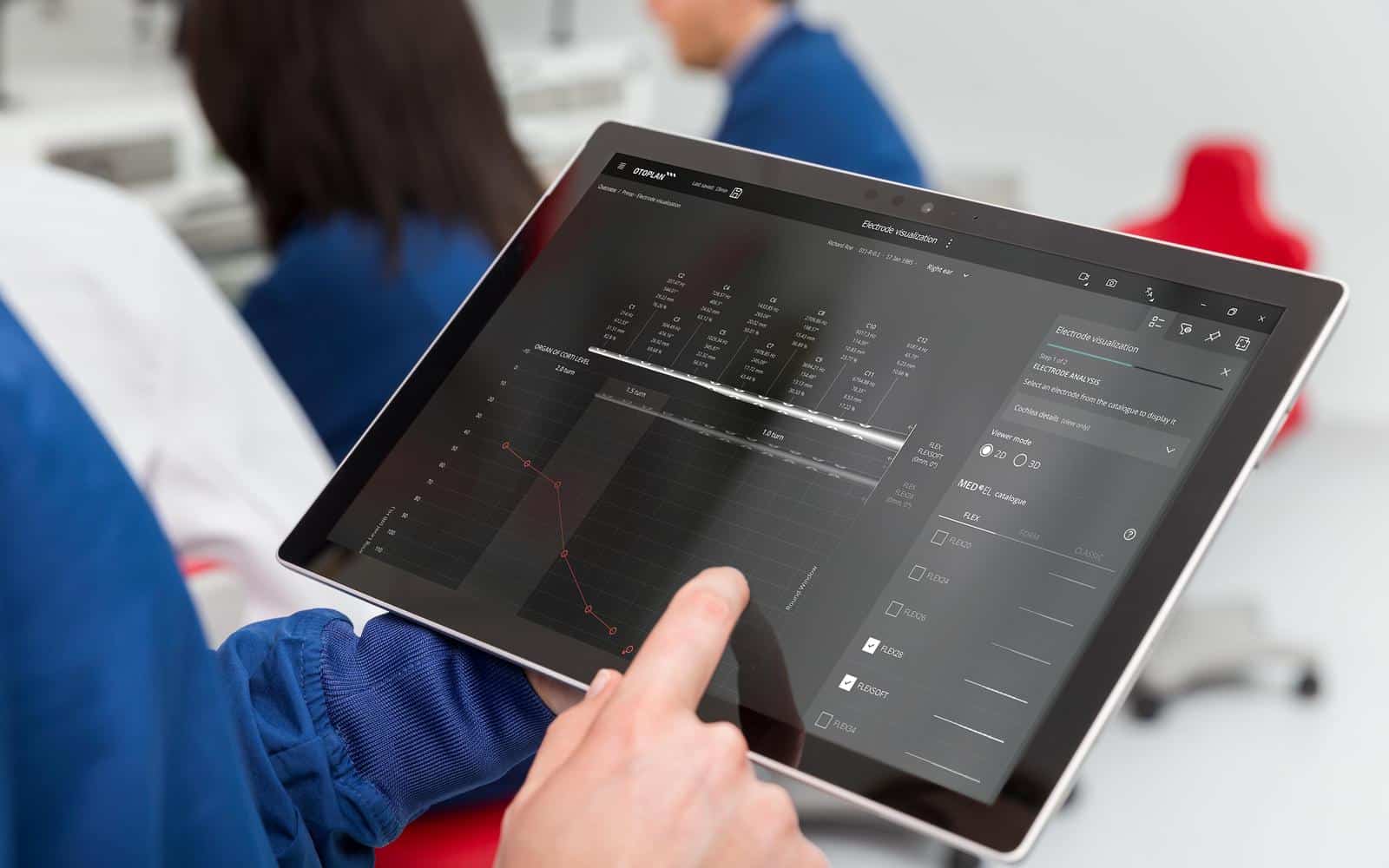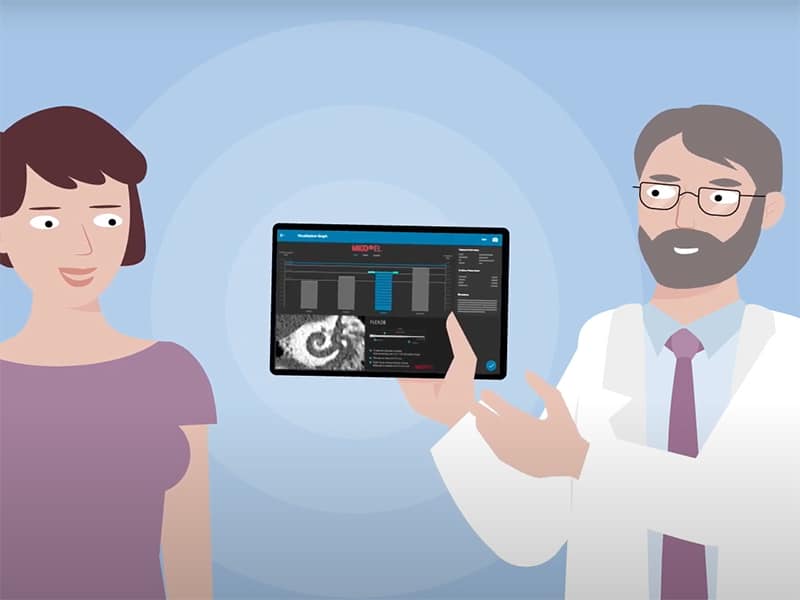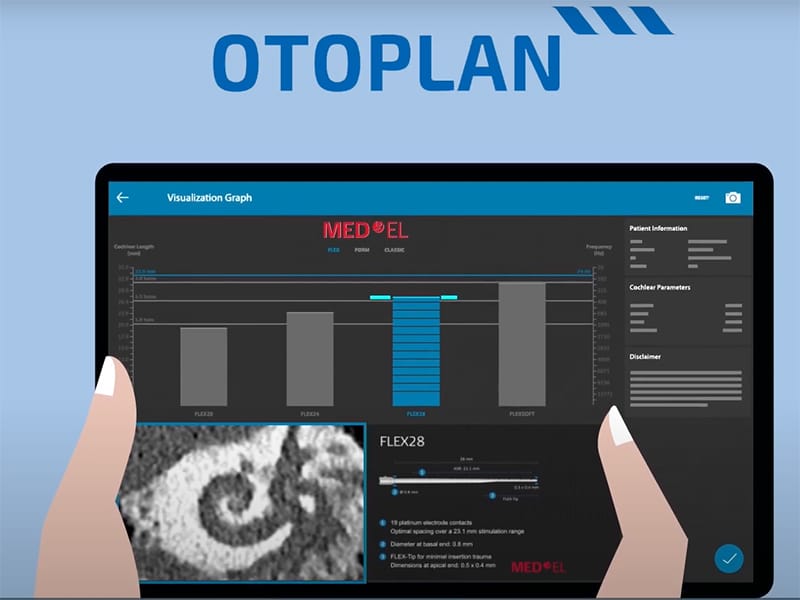
MED-EL
Published Oct 18, 2023
Cochlear Implant Individualization With OTOPLAN
Cochleae come in all shapes and sizes, and with OTOPLAN software, your surgeon can select the right electrode array to fit your individual cochlea. That way your cochlear implant can bring you closest to natural hearing. OTOPLAN, in combination with MED-EL’s broad portfolio of electrode arrays, makes cochlear implant individualization possible.

Every Cochlea Is Unique
Each cochlea is unique, so your cochlear implant should be too. The closer the length of your cochlear implant’s electrode array matches the length of your individual cochlea, the closer you can get to natural hearing. MED-EL offers a broad portfolio of electrode arrays, so you can have the cochlear implant that is right for your unique cochlea.
The FLEX series of free-fitting electrode arrays is designed for atraumatic insertion. This means they are made to avoid damaging your ear. So any hearing you may still have can remain intact. By keeping inner ear structures healthy, you are more likely to be able to benefit from future hearing technologies.

A Wide Portfolio of Electrode Arrays
Since one size doesn’t fit all when it comes to cochlear implants, your surgeon will need to determine which electrode array is the right length for your inner ear anatomy. MED-EL offers electrode arrays ranging in length from 20 to 34 mm.
But how will your surgeon know prior to surgery which electrode array will best fit your ear? They don’t need to do any guesswork. There’s a tool they can use to measure the length of your cochlea quickly and exactly—OTOPLAN.*
Streamlined, Individualized Otological Surgery
OTOPLAN is software—designed specifically for MED-EL cochlear implants—that can create a detailed, 3D model of your cochlea and can also be used to visualize how each electrode array would fit in your cochlea. So before the operation, your surgeon can see which electrode array will fit optimally and where each electrode will be.
This means better planning for your surgeon, and you will go home after implantation knowing you’ve received the best possible hearing solution for your individual inner ear anatomy.

Pitch-Perfect, Anatomy-Based Fitting
The next step after implantation is “switch-on” or “activation day.” Your audio processor will be turned on, and you will begin hearing with your cochlear implant for the first time. Your audiologist will need to make some adjustment to your audio processor to give you your best hearing.
Your implant’s electrodes are a bit like the strings on a guitar. Each one can stimulate a range of pitches. The electrodes at the beginning of your cochlea stimulate higher pitches, and the electrodes along the part of the array inserted deeper into your cochlea stimulate lower pitches.
That’s why it’s important to have an electrode array that covers the entire length of your unique cochlea. If the array does not extend deep enough, lower pitches will not be stimulated at the appropriate place in the cochlea, which can cause those pitches to sound tinny and unnatural.
And just like a guitar, it’s important that your cochlear implant is “well-tuned.” This “tuning” on activation day is called a “fitting.”
In addition to helping your surgeon plan your surgery, your audiologist can also use exact electrode placement information from OTOPLAN and a CT scan after implantation to make your implant fitting as individualized as possible.
OTOPLAN can provide your audiologist with the exact location of each electrode so they can be “tuned” or “fitted” to the pitches that best correspond to their exact location in the cochlea. This is referred to as anatomy-based fitting, and it can bring you closest to natural hearing.
Closest to Natural Hearing
But why is closest to natural hearing so important? More natural hearing may even make it possible for you to appreciate and enjoy listening to and making music.
References

MED-EL
Was this article helpful?
Thanks for your feedback.
Sign up for newsletter below for more.
Thanks for your feedback.
Please leave your message below.
Thanks for your message. We will reply as soon as possible.
Send us a message
Field is required
John Doe
Field is required
name@mail.com
Field is required
What do you think?
*OTOPLAN is a product of CASCINATION AG.
© MED-EL Medical Electronics. All rights reserved. The content on this website is for general informational purposes only and should not be taken as medical advice. Contact your doctor or hearing specialist to learn what type of hearing solution suits your specific needs. Not all products, features, or indications are approved in all countries.
Alfred Perz
October 19, 2023
Not applicable to current users????
MED-EL
October 19, 2023
Hi Alfred, thanks for your comment. OTOPLAN can also be used for post-operative implant assessment in current users and as a base for anatomy-based fitting (audio processor map adjustments based on the anatomical information from OTOPLAN). Please reach out to your local MED-EL team for further information: https://www.medel.com/clinic-finder Kind regards, Gordana
JENO GERMAN SR
October 19, 2023
I wish I knew about OTOPLAN when I got my first Cochlear implant. My hearing would be much clearer now.
MED-EL
October 19, 2023
Hi Jeno, thanks for your comment. OTOPLAN can also be used for post-operative implant assessment in current users and as a base for anatomy-based fitting (audio processor map adjustments based on the anatomical information from OTOPLAN). Please reach out to your local MED-EL team for further information: https://www.medel.com/clinic-finder Kind regards, Gordana
Mary Elgabalawi
October 25, 2023
Please send precise information about OTOPLAN and how to access it so I can forward this to my audiologist.
MED-EL
October 31, 2023
Hi Mary, thank you for your comment. OTOPLAN is a software for hearing professionals that can help to make your implant fitting as individualized as possible. You and your local audiologist can find further details on our website here: https://www.medel.pro/products/otoplan. They can contact us directly then via the contact form below. Kind Regards, Giulia

MED-EL

MED-EL
.png)



Conversation
3 Comments